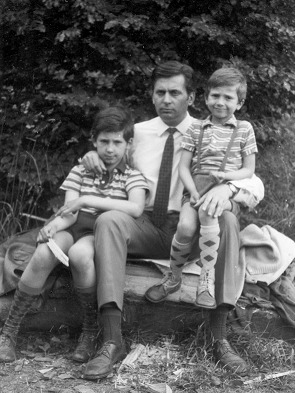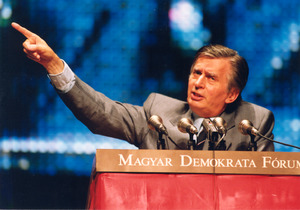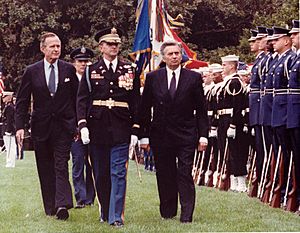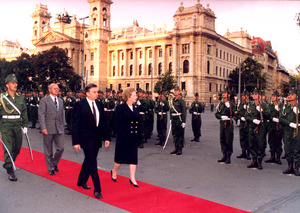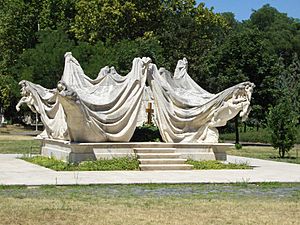József Antall facts for kids
Quick facts for kids
József Antall
|
|
|---|---|
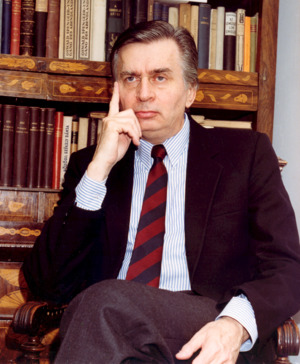
Antall in 1990
|
|
| Prime Minister of Hungary | |
| In office 23 May 1990 – 12 December 1993 |
|
| President | Árpád Göncz |
| Preceded by | Miklós Németh |
| Succeeded by | Péter Boross |
| Member of the National Assembly | |
| In office 2 May 1990 – 12 December 1993 |
|
| Personal details | |
| Born | 8 April 1932 Budapest, Hungary |
| Died | 12 December 1993 (aged 61) Budapest, Hungary |
| Political party | MDF |
| Spouse | Klára Fülepp |
| Children | 2 |
József Tihamér Antall Jr. (born April 8, 1932 – died December 12, 1993) was a Hungarian teacher, librarian, historian, and important leader. He became the first democratically elected Prime Minister of Hungary. He held this important job from May 1990 until he passed away in December 1993. He was also the leader of a political party called the Hungarian Democratic Forum starting in 1989.
Contents
Early Life and Education
József Antall was born in Budapest, Hungary, on April 8, 1932. His family had a long history in Hungary. His father, József Antall Sr., was a lawyer and worked for the government. He helped create the Independent Smallholders' Party in 1931. During World War II, his father helped refugees. He was even arrested by the Gestapo (a German police force) for a time. After the war, he became a minister in the government. Later, he led the Hungarian Red Cross. In 1991, he was honored for his actions during the war.
József's mother, Irén Szűcs, came from a family with Jewish roots. Her father was also a political figure. József had a sister named Edith. His brother-in-law, Géza Jeszenszky, later became a minister in József Antall's government.
József finished high school in 1950. He was interested in politics from a young age. He studied Hungarian language, literature, history, and how to manage archives at Eötvös Loránd University. He earned degrees in teaching, library science, and museology. In 1991, he received an honorary degree from Central Connecticut State University in the United States.
József Antall and his wife, Klára Fülepp, had two sons. György became a lawyer, and Péter became a photojournalist. Péter later became the director of the Antall József Knowledge Centre. This center works to keep József Antall's ideas alive and spread knowledge.
Early Career
After finishing university, Antall worked at the Hungarian State Archives. He also worked at a research institute for teaching. In 1955, he started teaching at a grammar school. During the 1956 Hungarian Uprising, he led a revolutionary group at his school. He also helped restart the Independent Smallholders Party. After the Soviet Union stopped the revolution, he was arrested and released a few times. He continued teaching until 1959, when he was banned from teaching because of his political activities.
After that, he worked as a librarian for two years. In 1963, he wrote about 80 doctors for a Hungarian biography book. He became very interested in the history of medicine. He started working at the Semmelweis Museum of Medical History. He began as a researcher and later became the director of the institute in 1974. His work was recognized around the world. In 1986, he was the vice president of an international group for the history of medicine.
Prime Minister
József Antall became involved in important talks about Hungary's future in 1989. These talks were called the National Roundtable Talks. He became well-known during these discussions.
On October 21, 1989, he was chosen to lead the Hungarian Democratic Forum (MDF) party. This made him the party's choice for prime minister. The MDF was expected to win the 1990 elections, and they did. They won many seats, almost enough for a majority. On May 23, he became the first prime minister since 1948 who was not a Communist.
He led a government made up of the MDF, the Independent Smallholders' Party, and the Christian Democratic People's Party. This was the first government in 44 years without Communists. He also made an agreement with the main opposition party, the Alliance of Free Democrats. This agreement helped set up how Hungary's new democracy would work.
Antall famously said he wanted to be the Prime Minister of 15 million Hungarians. This meant he cared about Hungarians living both inside and outside the country. He helped Hungary become closer to Europe and the United States. He played a big part in ending the Warsaw Pact (a military alliance) and the Comecon (an economic group). He also helped make sure Russian troops left Hungary in 1991. In 1991, he received the Robert Schuman Prize for his work to unite Europe and improve Hungary's ties with European countries.
As prime minister, Antall worked to create new laws for a market economy. This helped attract money from other countries. His government tried to make the economy stable. They also started to sell state-owned businesses to private owners. Some people in his party also talked a lot about the "national issue." This was about Hungarian people living in neighboring countries.
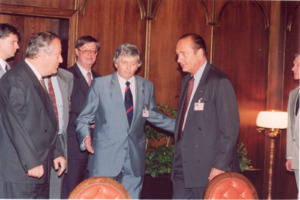
However, changing to a capitalist system caused some problems for Hungary. Unemployment, which was almost zero before, rose to 14 percent. Prices also went up a lot each year. Older people and those with lower incomes faced the most difficulties. The difference in income between rich and poor also grew. Crime rates, especially in Budapest, increased.
In 1990, Antall supported teaching Catholic religion in schools. This caused disagreements with other parties in his government. He appointed a minister to handle church affairs. This minister helped return church properties that the Communists had taken. By 1991, some people criticized Antall's leadership style. He also had disagreements with Hungary's President, Árpád Göncz, who was from an opposing party.
Antall faced challenges in Hungary. In 1990, there was a "taxi blockade" in Budapest, where taxi drivers protested. Also, one of his coalition parties left the government. This forced him to change his cabinet in 1992, which saved his government. Inside his own party, Antall was sometimes criticized by István Csurka. Csurka later started his own political movement.
Illness and Death
József Antall became ill in the summer of 1990. He was diagnosed with a type of cancer called non-Hodgkin lymphoma. In October, he had surgery. A famous interview with him was done in the hospital while he was wearing pajamas. This was to respond to the taxi blockade. His cancer returned about six months later.
The day before he died, President Árpád Göncz gave Antall a high honor, the Grand Cross of the Hungarian Order of Merit. During the last part of his time as prime minister, the Interior Minister, Péter Boross, took over his duties.
József Antall passed away on December 12, 1993. He died before his four-year term ended. His government was the longest-lasting and most stable post-communist government in the former Eastern Bloc. Péter Boross became the next prime minister. Antall was buried on December 18, 1993, at Kerepesi Cemetery. His tomb was built in 1999.
The Interruption of DuckTales
József Antall's death was announced on a Sunday afternoon. At that time, the state television channel, Magyar Televízió, was showing an episode of the cartoon DuckTales. Suddenly, the screen went black. Then the station logo appeared, and sad music (Frédéric Chopin's Funeral March) began to play. This sudden change made a strong memory for many children watching. Even as adults, they remember exactly when the cartoon stopped. Some of these adults say this event made them dislike politics.
Legacy
To honor his work, one of the buildings of the European Parliament in Brussels was named after him in 2008. There is also a statue of him in Budapest.
| Political offices | ||
|---|---|---|
| Preceded by Miklós Németh |
Prime Minister of Hungary 1990–1993 |
Succeeded by Péter Boross |
| Party political offices
|
||
| Preceded by Zoltán Bíró |
President of the Hungarian Democratic Forum 1989–1993 |
Succeeded by Lajos Für |
See also
 In Spanish: József Antall para niños
In Spanish: József Antall para niños
 | Chris Smalls |
 | Fred Hampton |
 | Ralph Abernathy |


